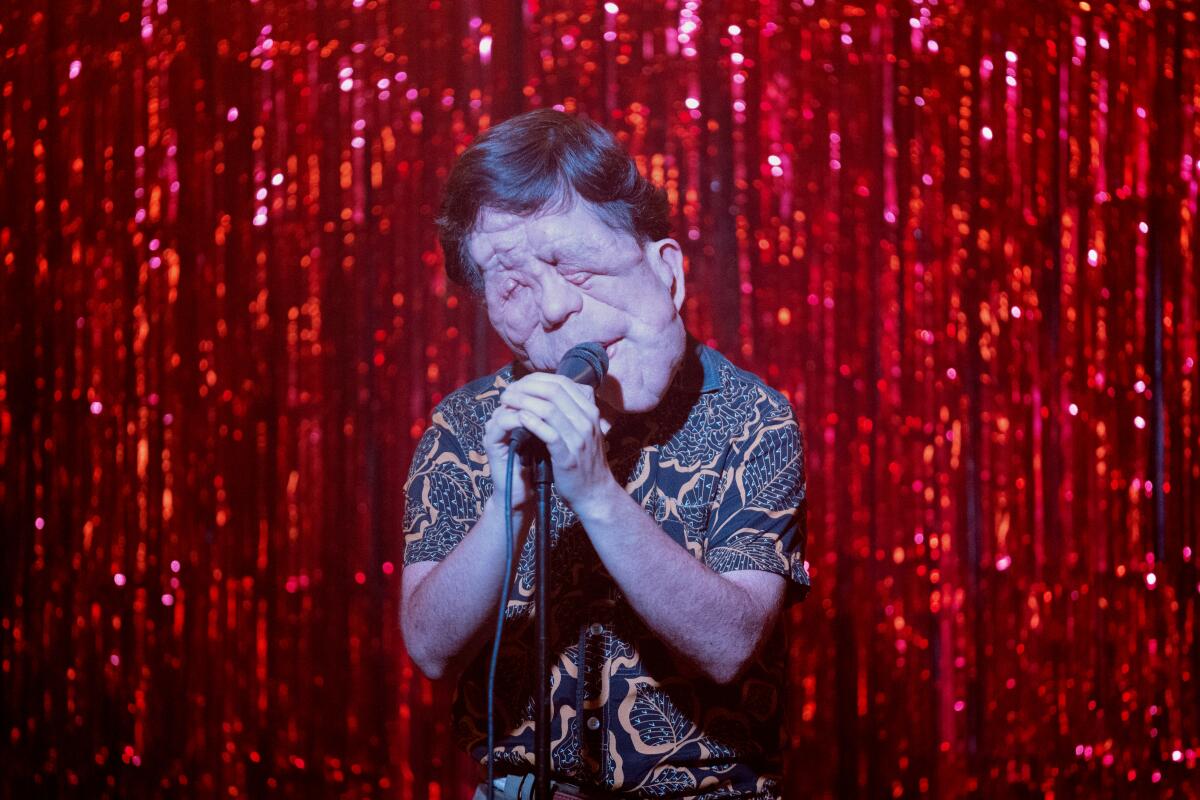Writer-director Aaron Schimberg unwraps the bandages on a fragile, anxious New Yorker’s experimental facial transformation in the strange, funny, superbly acted “A Different Man,” starring Sebastian Stan. A nightmare fantasy reminiscent of Rod Serling at his psyche-pricking cheekiest, it also traffics in cinematic signposts from a variety of decades that specialized in destabilizing entertainments: 1930s and ’40s horror noir, ’70s neurotic comedy and unvarnished ’80s-era indies about urban life.
In its off-kilter sensibilities, “A Different Man” fits in with Schimberg’s abiding curiosity about the tenuousness of identity. If you’ve seen his fleet, clever 2019 whatsit “Chained for Life,” about the vanities troubling a low-budget mad-scientist movie shoot starring a cast of disabled actors, you know how attuned Schimberg can be to everyday snubs and microaggressions. And as a student of all types of cinema, Schimberg makes sure to add one more layer: the way culture plays a huge part in how we perceive others and interact with the world.
When we meet Edward (Stan), a reserved man with severe facial deformities, his view of existence is pretty resigned: The world sees him as an oddity and he behaves like someone relegated to life’s background. Though he works as an actor — he has a role in a training video teaching employees how to behave around “facially different” co-workers (it’s as amusingly cringey as it sounds) — it’s not even clear that Edward sees himself as an artist. His job may as well be Lonely Guy in a Dark Apartment, with a stained, leaky, rapidly expanding hole in his ceiling for an irritating colleague.
Suddenly, though, he does get some encouraging, even flirty attention from attractive, sharp-eyed new neighbor Ingrid (“The Worst Person in the World” breakout Renate Reinsve), a self-professed playwright who hasn’t written anything yet. What Edward has been privately pursuing is a groundbreaking medical procedure that would reconfigure his face and flip the script of his life. In Schimberg’s world, everybody is so culture-conscious that even Edward’s doctor says, “You might be part of a documentary someday.”
One painful night, Edward discovers how well the treatment is working when his face begins falling off in gooey, bloody clumps, revealing someone in the mirror who looks like, well, Sebastian Stan. Just as swiftly, Edward lunges at the opportunity for revision, calling himself “Guy” the next day to his building’s super, who doesn’t recognize him, and blithely informing him that Edward has died.
Adam Pearson, left, and Sebastian Stan in the movie “A Different Man.”
(Matt Infante / A24)
Schimberg wastes no time with this pivot, jumping ahead to a point when Guy is now a hot-shot real estate agent with a swanky apartment, an office fling and his “man candy” handsomeness plastered all over the company’s sleek ads. But one day, he notices his old neighbor Ingrid in the street, and he can’t help himself. Following her into a tiny theater, he discovers she’s trying out actors for her first play, about a soulful, sad, disfigured man named Edward. The self he left behind is now, as imagined by the woman who got away, the role of a lifetime. But also, a dangerous portal.
In channeling John Frankenheimer’s 1966 psychodrama “Seconds” by way of “Beauty and the Beast,” Schimberg has delectably weirder, self-destructive plans for his made-over protagonist — a doom loop of personality disintegration as the past catches up with him. Edward was authentic, something he abandoned to become the generic “Guy,” only capable of being appreciated when wearing the mask of his previous self.
Leave it to the artistic process and a third collaborator — Guy’s understudy Oswald (the wonderful Adam Pearson of “Under the Skin,” who has neurofibromatosis) — to deepen these cracked-mirror problems. Ingrid’s restless search for ethical truth (not to mention good reviews and a packed house) finds her turning more and more toward the wisdom and friendly charm of Oswald, who shares a facial physiognomy with Edward, but whose charming confidence and rich, rewarding life couldn’t be further from the morose man of the movie’s first half. Or, for that matter, the jealous, craven Guy rising to the surface, whom Stan nails hilariously with each stewing grimace.

Adam Pearson in the movie “A Different Man.”
(Matt Infante / A24)
The Kafkaesque reversal-of-fortune humor that follows — centered on how outgoing, beloved Oswald’s mere presence pours salt on Guy/Edward’s identity crisis — is as shrewdly conceived a comic bad dream as we’ve gotten since the heyday of “Zelig”-era Woody Allen or Charlie Kaufman (whose film “Synecdoche, New York” this feels like a cousin to). Adding to the movie’s throwback mood is Wyatt Garfield’s grainy 16mm photography and Umberto Smerilli’s striking dirge of a score, both of which go a long way toward establishing an unforgiving, lose-yourself metropolis, which occasionally put me in mind of Roman Polanski’s “The Tenant.”
But there’s also something lovely to be left with from this be-careful-what-you-wish-for scenario, and that’s the future for actor Pearson, whom Schimberg first memorably cast in “Chained for Life,” and whose abiding charisma breathes life into the script’s concerns. Pearson’s been given a great role here, for sure, and in the wake of “A Different Man,” which may be the last word on disability-themed satires, one hopes he’ll become known enough to forge a career predicated on nothing less than his proven range. Which would be a welcome change, indeed.
‘A Different Man’
Rating: R, for sexual content, graphic nudity, language and some violent content
Running time: 1 hour, 52 minutes
Playing: In limited release Friday, Sept. 20


